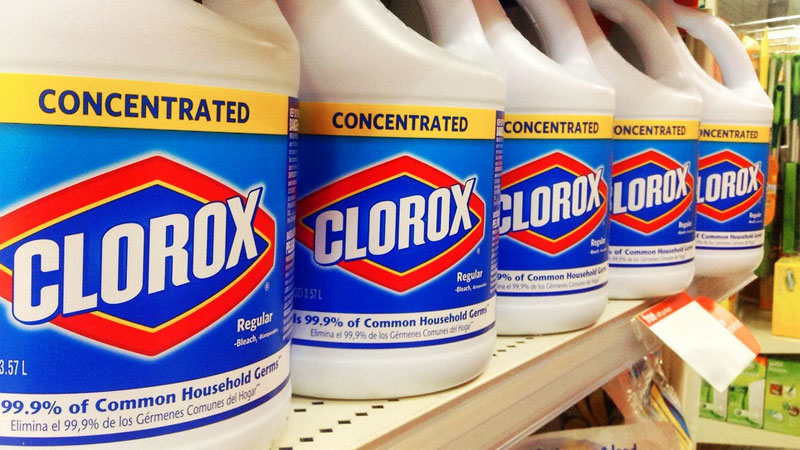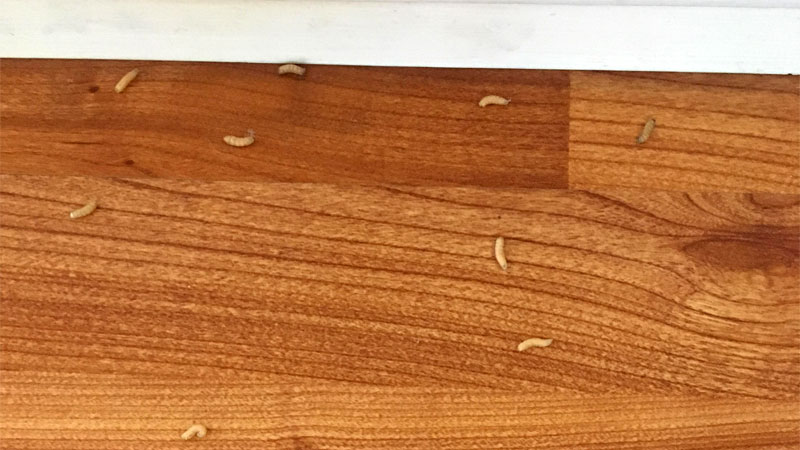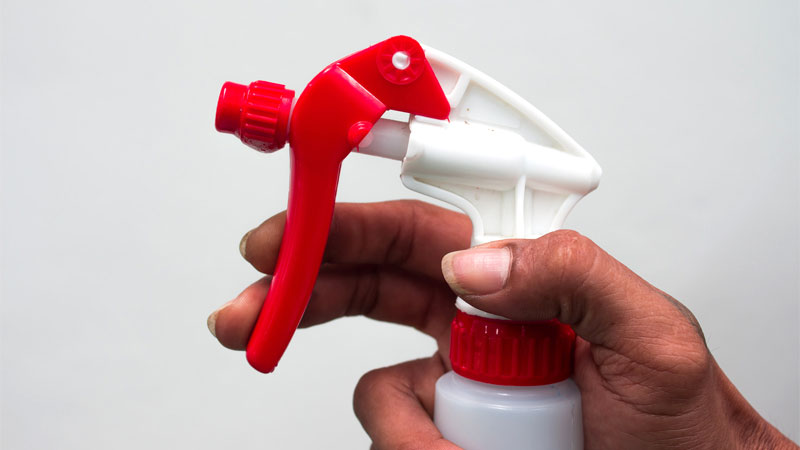There are a lot of bugs you don’t want to see in the kitchen, such as silverfish or roaches. However, one of the worst has to be maggots. Finding maggots means the surface or food is contaminated. It also means fruit flies or house flies will appear within a few days if the problem isn’t dealt with immediately.
Even worse, failing to deal with the problem quickly could lead to a population explosion that will spread throughout your home in only a few weeks.
Since kitchen surfaces where maggots are discovered must be sterilized and the maggots must be killed, you might be wondering if you can do both at once. Bleach is often the go-to for killing germs, but what if you used it on the maggots as well?
Will it kill them or will it make matters worse? There are pros and cons to using bleach or any other household chemical, so it’s important to know the facts.
Related: What Purpose Do Flies Serve?
Does Bleach Kill Maggots?
Yes, bleach will indeed kill maggots and many other pests, but there are some things to consider before you pour it all over your kitchen. Let’s take a look at why you may or may not want to use bleach, how to use it effectively, and how effective it really is against maggots.
Why Consider Using Bleach?
We’re all familiar with the cleaning power of bleach. The term “bleach” is most often used to refer to a diluted solution of sodium hypochlorite, but can also refer to any product that removes color from fiber. Of course, we’re talking about household bleach here (such as Clorox), which usually uses chlorine as an active ingredient.
Bleach is used to kill molds, mildews, algae, bacteria, and all sorts of other contaminants. A single capful can treat an entire bathtub (although, let’s face it, we usually use a lot more than that).
Bleach is also found in a wide range of household cleaning products, such as laundry detergent, toilet cleaners and surfactants. This means you’d be hard-pressed to not have some in your home at any given moment.
One really interesting thing about bleach is that it can kill a number of pests, yet it’s actually almost healthy for your plants. It can be used to treat root rot, for example. This means it’s a great option if you have the maggots of gnats or other pests hanging out in potting soil.
But, of course, the biggest reason you may wish to use bleach on maggots is the fact that it’s a two-in-one attack. Not only are you killing the maggots, but sterilizing the surface at the same time.
Reasons You May NOT Want to Use Bleach
It’s all well and good to ramble on about all the reasons you might want to use bleach for your infestation, but we’d be doing a disservice if we didn’t also talk about the downsides of using bleach.
#1 – Odor
The most obvious one is the odor, which is unmistakable and often overwhelming. It’s important to always use bleach in a well-ventilated area because the fumes can be harmful. It’s also highly toxic if ingested.
#2 – Can Damage Some Surfaces
But the other big concern is what it can do to your surfaces. It’s generally safe on countertops, but (as we mentioned earlier) bleach is largely defined by its ability to, well, bleach surfaces. This means you run a risk of damaging painted or papered surfaces. It can also sometimes stain a surface if it pulls out hues and causes them to run.
All in all, the best advice is to always test a tiny area first to make sure it won’t damage the surface and to make sure there’s no food or drinks near the area you’re treating in case of splashing. You should also wear protective gear, as bleach can be corrosive if it gets on your skin and isn’t immediately washed off.
#3 – Poor Choice for Large Maggot Infestations
Finally, please be aware that this is a poor choice if you’re trying to remove a large quantity of maggots. If an animal died in your garage and maggots have begun swarming it, bleach just won’t do much and you’re going to have to eliminate the maggots using a different method (although you can certainly go back afterwards to sterilize the area with bleach).
Instead, this remedy works best on small-scale infestations such as one you might find suddenly in the kitchen or a trash can.
How to Use Bleach to Kill Maggots
Bleach is a powerful chemical, so you will need to dilute it before use. One of the most popular methods is to mix equal parts bleach and water. The water can be straight from the tap, boiling, or soapy, depending on your preference.
Some people also like to add some additional ingredients, such as bay leaves, peppermint, or even the contents of silica packets (those little inedible packets you often find in foods that are moisture sensitive), although these aren’t necessary for the bleach to do its job.
Pour your diluted bleach into a spray bottle (try to avoid plastic bottles if you’re using boiling water) or gallon bucket if you want to pour or mop with it.
Empty out your garbage can and spray down the insides or pour some of the bleach water into it. The spray will also help you clean the garbage can and will focus more on contact killing, whereas pouring bleach will kill the maggots primarily through fumes.
Put a lid on the can for 30 minutes to an hour so the fumes can build up and be more effective. Once you’re done, empty any bleach water from the can and give it a good washing.
Spray down any surfaces where you’ve noticed maggots (being sure those surfaces are safe first) and let the bleach sit for 30 to 45 minutes before rinsing away with hot water.
And for floors, you can mop using the bleach water. Traditional rope mops tend to work best, but a sponge mop will also work if you use a head specifically for bleach to avoid any potential chemical reactions.
Again, usher out any kids or pets and allow the bleach water to sit for 30 to 45 minutes before rinsing the floor with hot water.
How Long Does It Take for Bleach to Kill Maggots?
Bleach isn’t an instant killer and works via chemical burns and suffocation through the toxic fumes. That said, it can still be pretty quick and maggots will generally begin to die around 30 minutes after exposure.
You can speed things up a little bit when using soapy or boiling water
Will Bleach Keep Maggots Away?
Regularly cleaning surfaces with bleach actually can help prevent them from returning. First of all, the smell of bleach overwhelms the scent of rotting food, which attracts flies.
Also, regularly bleaching surfaces can kill any eggs that the flies manage to lay. However, you shouldn’t rely on cleaning with bleach to prevent maggots from appearing, as it’s not a guaranteed solution.
Dealing With the Source
Instead of hoping the bleach alone will keep flies from returning, try to take steps to actively prevent them (and other unwanted critters) from reappearing. This is a multi-step process, but one you should do every six months (and maintain throughout the rest of the year).
Go through your home and check to ensure all of the doors and windows have screens that aren’t broken. Check to make sure all of the caulking around windows or door frames is in good condition. You can also do the smoke test to find access points in the walls and seal them.
Also, flush out all of your drains to ensure you won’t get drain flies. By doing this twice per year, you can save on your HVAC bills and also keep flies from coming inside.
Of course, regular cleaning also really helps.
- Vacuuming will remove food debris that might attract flies.
- Keep up with your dishes and clean up countertops after using them with some antibacterial wipes or good old-fashioned soapy water.
- Don’t allow food waste to build up in the sink and regularly clean your waste disposal according to the owner’s manual.
- Running an empty dishwasher with some vinegar or a cleaning bar once every few months and letting it dry out with the door open can also help prevent the dishwasher from smelling or attracting flies.
Finally, garbage cans will always be a problem. Try to avoid putting food debris straight into the trash can that will spoil quickly. Instead, try sealing it into a smaller bag before throwing it out. And if you are throwing away a lot of rotten food, take the bag to your outside can.
Spraying a few spritzes of your bleach solution can also help, but only for a day or two. And if you live in an area prone to fly infestations during the summer, be proactive and invest in some sticky traps, homemade vinegar traps, or carnivorous plants so any risk of infestation will be caught before it can begin.
- How to Get Rid of Hawks - March 8, 2024
- How to Get Rid of Pill Bugs (Rolly Pollies) - March 1, 2024
- How to Get Rid of Groundhogs (Woodchucks) - February 5, 2024





